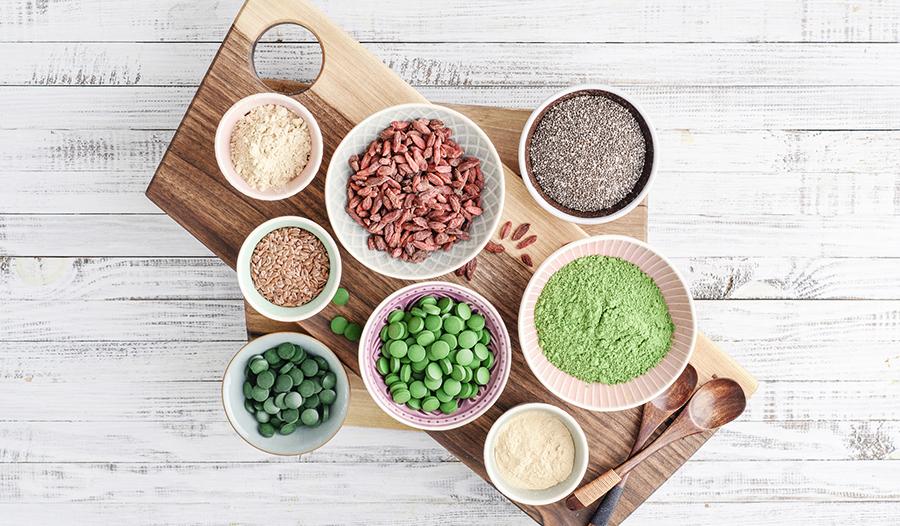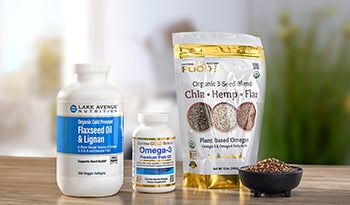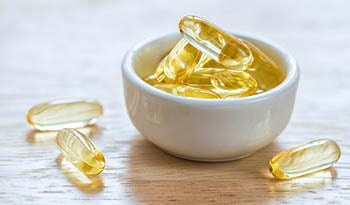Top Vegan Sources of Omega-3s
DISCLAIMER:This blog does not intend to provide diagnosis...

By Casey Seiden MS, RD, CDN CDE
By now, most of us can agree that getting your daily dose of healthy fats is a good thing. With avocado toast trending and sustainable fish delivery services popping up everywhere, the public is taking notice and looking for ways to easily include them in their diets. If you’re a “flexible” eater and consume a wide variety of foods, you are likely able to obtain plenty of omega-3 fatty acids (a form of “good” fat) from seafood like salmon, mackerel and oysters, with the option of also taking cod liver or fish oil supplements; however, if you are a vegan or vegetarian, it can become a bit more challenging to meet the daily recommended dose of omega-3s.
But, fear not! For vegans, or anyone simply not eating seafood or supplementing on the regular, there are many plant sources of omega-3 fatty acids.
What Are Omega-3s?
For a quick recap, here is a breakdown of what exactly omega-3 fatty acids are and why they are so critical for our health. Fat is one of the three main macronutrients (the others being protein and carbohydrates) that are essential for cell membrane structure, hormone production and energy storage. Within the fat “family” we have saturated, monounsaturated and polyunsaturated fats. Omega-3 fatty acids are found under the polyunsaturated fat umbrella and there are four main omega-3s:
- Alpha-linolenic acid (ALA)
- Eicosapentaenoic acid (EPA)
- Docosapentaenoic acid (DPA)
- Docosahexaenoic acid (DHA)
This group of fats has been widely studied and shown to lower triglyceride and cholesterol levels, which may reduce the risk of blood clots, decreasing blood pressure and reduce inflammation. Clearly, we want to include a good amount of these fats in our diets.
Of these omega-3s, ALA is considered “essential,” meaning that this is the one we must consume from food - it’s found in various seeds and legumes. While there is no set Recommended Dietary Intake (RDI) for ALA, the daily recommended intake according to the National Academy of Medicine is 1,100 mg for adult women and 1,600 for adult men. As for the others - EPA, DPA and DHA - the human body is a pretty amazing system that can convert ALA into them. Sounds like a pretty nice, foolproof system, right? Not exactly. The tricky part is that EPA and DHA - the fatty acids found in high amounts in fish - don’t get made from ALA at very high rates, with only about 2-10% switching over.
This doesn’t pose a huge problem for seafood eaters, but it’s a different story for vegans or those who have been supplementing with fish oil capsules and are looking for an alternative. So, the question remains, if vegetarians aren’t consuming fish, is there a way they can get their EPA and DHA from plants? Furthermore, what foods can they prioritize that are high in ALA that will result in at least some conversion to EPA and DHA? Below you’ll find an omega-3 toolkit for vegans.
Plant Sources of ALA
Luckily, ALA is found exclusively in plants, so vegans, vegetarians, and meat-eaters should be adding these foods to their shopping lists weekly and sprinkling them into their meals and snacks daily. Here are the best sources of ALA and ways you can consider consuming them in your diet:
Flaxseeds
Flaxseeds are one of the highest sources of ALA. These seeds are best absorbed when ground, so either purchase whole seeds and grid them yourself as needed, or purchase ground flaxseed and keep refrigerated for freshness. You’ll now notice this super seed included in a myriad of products, from crackers to granola.
Flaxseed Oil
For another convenient source, flaxseeds can be cold-pressed and made into high-quality oil. Flaxseed oil is useful for salad dressings or as a finishing oil for roasted vegetables. You can also find flaxseed oil capsules, but note that depending on the concentration you might be popping anywhere from 2-8 capsules per day to get in the recommended dose.
Chia Seeds
The mighty seed that swells when added to liquid is a fantastic source of this omega-3. Chia seeds can be easily sprinkled into your smoothies or overnight oats.
Hemp Seeds and Hemp Seed Oil
Nature got it right when it comes to hemp seeds, which can be tossed into pancake batter or atop an avocado toast. You may also be interested to try a tablespoon of hemp seed oil in cold preparations such as dressings and marinades. Typically hulled from its outer shell, hemp seeds contain 2,090 mg omega-3 fatty acids per an average 3 tablespoon serving.
Walnuts
This toasty nut provides ample omega-3s and certainly will not result in the same smelly belches as a fish oil supplement. Store walnuts in the fridge to preserve the healthy fats and enjoy walnuts in your grain bowl or as a crunchy soup garnish.
Wheat Germ
Alternative flours are all the rage right now, which is why you may be seeing more wheat germ in baking recipes. It’s not gluten-free but has benefits of unsaturated fats and other anti-inflammatory nutrients such as vitamin E, zinc, and magnesium.
Plant Sources of EPA and DHA
If you’re bypassing the fish counter, you can still find vegan-friendly sources of EPA and DHA in the grocery aisles, as well as in the supplement section. Algae are the most well-known plant source of EPA and DHA, and have grown in popularity over the past few years, sometimes being called “green gold.” Now, if you’re thinking you’d never eat a green, seemingly slimy ocean floor plant, you may be surprised to learn that it’s being added to your juice bar drink or poké bowl under a pseudonym. Algae goes by many names - here’s how to spot this seafaring superfood.
Seaweed or Nori
Seaweed is a member of the algae family that is commonly used for sushi, but is now popping up in seaweed crisps, nori snack sheets and as a seasoning called gomasio.
Spirulina
A favorite of boutique juice bars, spirulina is a blue-green algae commonly found in powder form, that provides a bright green color due to its high chlorophyll content. While spirulina does contain some EPA and DHA, it’s overall very low in fat and actually contains more omega-6 fatty acids than can be inflammatory if consumed in higher amounts compared to omega-3s.
Vegan Omega-3 Supplements
In general, vegans and vegetarians can obtain a fair amount of ALA, EPA, and DHA from food sources, however, the question of conversion remains. For example, a person’s intake of algae would have to be much higher than what we’re seeing in current eating patterns in the United States, and it is important to note that some of these plant foods are high in inflammatory omega-6 fatty acids. It’s also vital to consider that during certain stages of life, such as pregnancy and if choosing to breastfeed, the need for these omega-3s increases for baby’s brain and eye development. For these reasons, supplements would certainly be encouraged in vegans and anyone struggling to obtain adequate intake from whole foods.
Vegan omega-3 supplements are often sourced from algae and combined with oil, usually omega-6 rich sunflower oil, which is packaged up as a soft gel capsule. Some supplements only contain DHA, with a typical serving of 2 capsules supplying 500mg DHA, while others provide a combination of both omega-3s, with a slightly lower amount of EPA than DHA. Remember than when shopping for supplements, be sure to read the ingredient list in full as some may contain gelatin, which would not qualify as vegan.

 By Casey Seiden MS, RD, CDN CDE
By Casey Seiden MS, RD, CDN CDE


